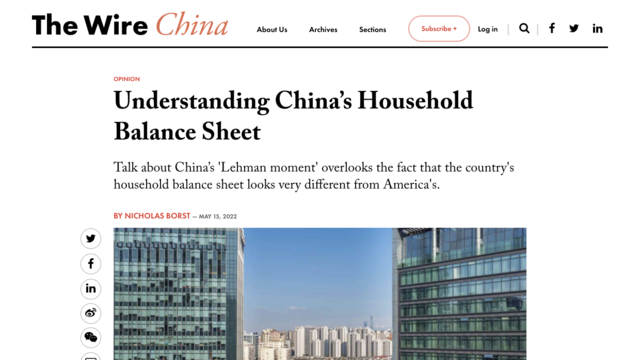Nicholas Borst explains that a balance sheet approach to analyzing the Chinese economy yields important insights into the country’s financial risks and overall resiliency.
China's most pressing financial risks are linked to weak balance sheets, including those of state-owned enterprises, local governments, and property developers. Repairing these broken balance sheets without damaging the rest of the economy is the key challenge for Chinese policymakers. – Nicholas Borst
China’s National Balance Sheet – A Framework for Analysis

– The risks of China’s economy and debt levels should be evaluated in the context of its national balance sheet – taking into account the interconnected assets and liabilities between households, corporations, financial institutions, and the government.
China’s National Balance Sheet – A Framework for AnalysisHow Strong is China’s Household Balance Sheet?

– China’s household balance sheet is stronger than commonly thought, but it is still vulnerable to shifts in the real estate market.
How Strong is China’s Household Balance Sheet?Fixing China’s Broken Balance Sheets

– China’s approach to repairing weak balance sheets and preventing financial instability reflects lessons learned from past crises and the current priorities of Xi Jinping.
Fixing China’s Broken Balance SheetsThe Balance Sheet Constraints on China’s Economic Stimulus

– As China faces major economic headwinds, Beijing’s attempts to stimulate growth are constrained by large contingent liabilities and a struggle for fiscal control with local governments.
The Balance Sheet Constraints on China’s Economic StimulusThe Balance Sheets at Risk from China’s Property Slowdown

– The fallout from the end of China’s property boom will continue for many years as its effects ripple through the balance sheets of property developers, banks, and local governments.
The Balance Sheets at Risk from China’s Property SlowdownNews and Media
The Wire China – Understanding China’s Household Balance Sheet

– In The Wire China, Seafarer’s Nicholas Borst writes that the strength of China’s household balance sheet depends on residential housing prices remaining high.
MoreToday On Wall St. – Is Evergrande China’s Lehman Moment?

– In an interview with Today On Wall St., Seafarer’s Nicholas Borst explains why discussion of a “Lehman Moment” in China overlooks the fact that the country’s property sector is grappling with problems distinct from those the U.S. faced in 2008. : As of March 31, 2022, the Seafarer Funds did not own shares in the entities referenced in the video. View the Top 10 Holdings for the Growth and Income Fund and the Value Fund. Holdings are subject to change.
MoreThe Diplomat – China’s Interventionist Approach to Managing Financial Risks

– In The Diplomat, Seafarer’s Nicholas Borst writes that China’s new approach to cleaning up the financial sector is likely to result in a more state-centric economy. : As of June 30, 2022, the Seafarer Funds did not own shares in the entities referenced in the article. View the Top 10 Holdings for the Growth and Income Fund and the Value Fund. Holdings are subject to change.
MoreOMFIF – China’s Economic Recovery is Balance Sheet Constrained

– In OMFIF, Seafarer’s Nicholas Borst writes that Beijing can no longer spare its own balance sheet if it wants to both stimulate the economy and keep local governments solvent. : As of September 30, 2022, the Seafarer Funds did not own shares in the entities referenced in the article. View the Top 10 Holdings for the Growth and Income Fund and the Value Fund. Holdings are subject to change.
MoreChina’s Balance Sheet Challenge

– In an article for China Leadership Monitor, Nicholas Borst examines the scale of China’s debt problem and how policymakers can put the country’s balance sheet on firmer footing. : As of December 31, 2022, Alibaba Group Holding, Ltd. comprised 3.9% of the Seafarer Overseas Growth and Income Fund. View the Seafarer Overseas Growth and Income Fund’s Top 10 Holdings. As of December 31, 2022, the Seafarer Funds did not own shares in the other securities referenced in this commentary. Holdings are subject to change.
China’s Balance Sheet ChallengeCSIS ChinaPower Podcast – Interview with Nicholas Borst

– In an interview with the CSIS ChinaPower Podcast, Nicholas Borst discusses how growing debt levels in China – concentrated among local governments, real estate developers, and state-owned enterprises – stem from an imbalanced fiscal system, and why they are a source of financial risk.
MoreThe Wire China – The Financial Fallout from China’s Property Market

– In The Wire China, Seafarer’s Nicholas Borst writes that China’s economic recovery will continue to disappoint unless urgent reforms are enacted to revive the property market and restructure local government debt. : As of December 31, 2023, the Seafarer Funds did not own shares in the securities referenced in the article. View the Top 10 Holdings for the Growth and Income Fund and the Value Fund. Holdings are subject to change.
More![[Chrome]](/_layout/images/ua/chrome.png)
![[Firefox]](/_layout/images/ua/firefox.png)
![[Opera]](/_layout/images/ua/opera.png)
![[Microsoft Edge]](/_layout/images/ua/edge.png)